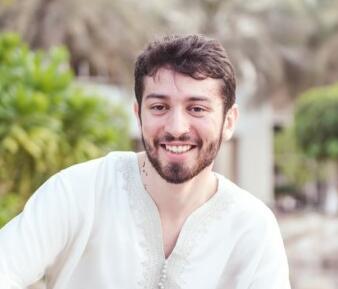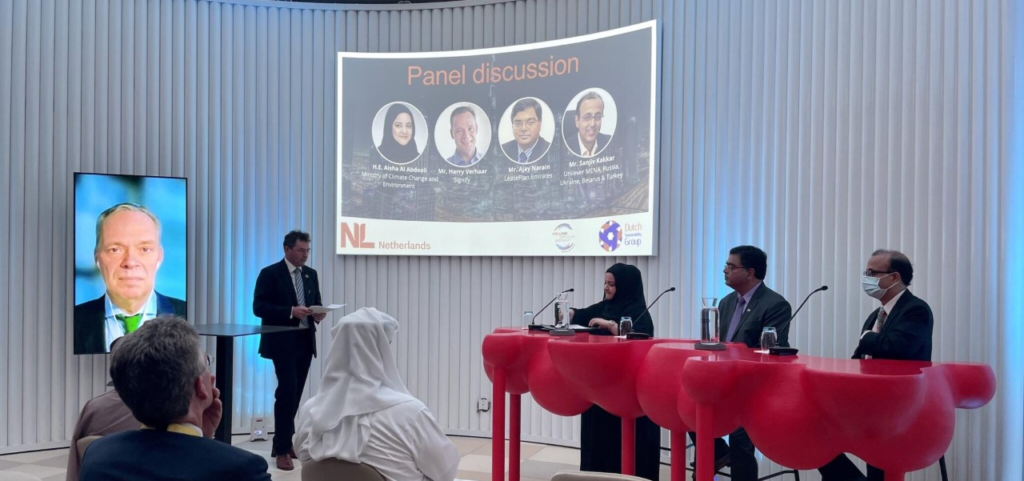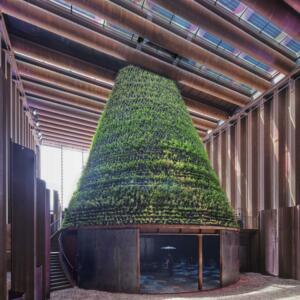UAE: making the shift towards circular economy
March 07, 2022
Circular economy in the UAE has seen considerable attention from the highest level, especially in the past two years. Mohammed el Mehdi Diouri, Regional Economic Advisor in the Gulf region for The Netherlands Embassy and Consulate in the UAE wrote this blog to share his insights in the circular developments in the UAE and Dutch-UAE collaboration.
Disclaimer: Holland Circular Hotspot publishes opinions on CE from a wide range of perspectives in hopes of promoting constructive debate about consequential questions about Circular Economy.

High levels of waste and consumption spark UAE's circular journey
The country has put in place a circular economy policy and a council to oversee its implementation starting beginning of 2021, established with the leadership of HH Sheikh Mohammed bin Rashid Al Maktoum, Vice-President, Prime Minister and Ruler of Dubai.
The policy provides a framework to work on circular economy across several priority sectors, amongst others, green infrastructure and sustainable manufacturing, through R&D, capacity building and establishing partnerships, and cooperation platforms. The policy was developed jointly by several ministries, including the Ministry of Climate Change and Environment (MoCCAE), the Ministry of Economy, the Ministry of Cabinet Affairs, and the Office of the Minister of State for Artificial Intelligence, Digital Economy and Remote Work Applications.
The policy was not the first step in the UAE’s journey, however, as a result of the high level of consumption and waste per capita, the UAE government created the Sustainable Consumption and Production plan in 2017, to tackle the highest production and consumption sectors. In addition, Coalition Circle was formed in 2019 comprising of the government, NGOs, global and local private companies. The coalition has signed a pledge with the Ministry of Climate Change and Environment (MOCCAE) to develop a circular economy model to combat the issue of plastic and packaging waste pollution by improving collection in the United Arab Emirates.

Stepping stones in the bilateral collaboration between the Netherlands and the UAE
The Dutch Consulate and Embassy have been in touch with the Circular Economy team from the UAE Ministry of the Climate Change and Environment since 2020 to explore opportunities for collaboration as the plans of both countries have similar priorities and sectors. The Dutch Sustainability Group, a group of established Dutch companies present in the UAE aimed at advancing sustainability in the region, alongside Holland Circular Hotspot, organized a Circular Economy event to explore the topics of Circular Economy, Energy and Waste Management.
A recording of the event is in the platform DutchDubai, which also includes several other events organized at the Expo pavilion: www.virtual.dutchdubai.com
We are working together with the local ministry to advance further our collaboration in the future, namely through the upcoming mission in March 2022 with the presence of the Minister of Infrastructure and Water Management. For registrations, please visit the link, here.

Photo: Dutch Sustainability Group event on circularity at The Netherlands Pavilion at the World Expo 2020 in Dubai
First seeds for the circular transition
In both the public and private sector, we continue to see initiatives that contribute to achieving a circular economy and as a way forward for post-Covid-19 economy. Examples include Emirates Global Aluminium (EGA) recycling its SPL hazardous waste generated every year. EGA has recently announced plans to build an Aluminum Recycling Facility aiming to process 150,000 tons per year of post-consumer materials. Gulf Cement in Ras Al Khaimah is using camel manure to generate fuel used in making cement, therefore, saving 18,000 tons of carbon emissions. Supermarkets have been limiting and charging for plastic bags and the government of Dubai has just announced recently that it will start charging for single-use plastic bags from July 1 this year. As part of the Sharing Economy, some examples of Products-as-a-Service are flourishing, with car sharing services like Ekar and Udrive, as well as other e-scooters schemes.
The UAE has started to lay the foundation towards optimizing waste management, targeting to divert 75% of its solid waste from landfills by 2021. Several emirates have established plans, encompassing recycling and Waste-to-Energy solutions. Emirates Waste to Energy Company is set to build the UAE’s first waste-to-energy plant in 2021 that will process solid waste to generate electricity, divert waste from landfills, and displace almost 450,000 tons of CO2 emissions annually. The environmental management firm, Bee’ah, partnered with the UAE-based startup, Seramic Materials, to turn ashes from municipal solid waste incinerators into sustainable, affordable, and durable construction materials. Last year in Abu Dhabi, the Ministry of Climate Change and Environment launched a closed-loop recycling model for plastic bottles, beverage cartons, and other packaging in Abu Dhabi in collaboration with a coalition formed by NGOs, local and global food MNCs. Expo 2020 Dubai, a major event drawing millions of visitors, is working with Dulsco to divert 85% of its waste, with an estimated 173 tons of waste generated daily.
Circular Construction
The construction sector has not been performing well, with decreasing number of awarded projects since 2019. The construction sector is particularly important as one of the drivers of the local economy. Closely linked, real estate prices went down with rent decreasing up to 20% in some regions. Spoiler alert, the result of pandemic and economic shift, which has pushed the government to seriously invest in circular economy solutions, has led the construction market to shift more to re-evaluation of the city and retrofit solutions.
We are seeing more awareness in city planning by turning away from “let it build because we need to accommodate” mentality. There is still urban sprawl effect due to the past baby boomers trends in the Gulf region, but we are more likely to see a shift towards compactness and increase of brownfield development, as well as an increase in mixed-used developments (live, play and work).
Due to the importance of sustainability in the built environment, the new building regulations and economic rationale, there is more appetite towards energy efficiency, smart construction (construction sector is ranked #1 least digitized industry), reusing and recycling, continued demand for energy managers and efficiency in HVAC systems, efficient types of paints, facades, etc.
The economic teams of the Embassy and Consulate of the Netherlands in UAE are organizing events and missions in cross-relevant topics, exploring opportunities with local project owners, sustainable cities projects, and energy servicing companies for collaborations with Dutch solution providers.
The Netherlands is participating at Expo 2020 Dubai with one of the most sustainable pavilions, planning to be the first to disappear once the world fair ends in March and its parts reused and recycled. The pavilion, a manifestation of circularity, has won the Best Sustainable Construction Project of the Year for its temporary circular climate system. The facilities of the pavilion are used for a number of events promoting the Water-Energy-Food Nexus by the Embassy and Consulate of the Netherlands in UAE, Dutch companies, their partners and local stakeholders.
Photo: The ‘Cone’ at the Netherlands Pavilion at World Expo 2020 in Dubai
Credits: V8 Architects / Jeroen Musc
Circular Plastics
A typical UAE resident uses 450 plastic water bottles on an average in a single year. With the equivalent of 43 gallons on an average per person in 2011, the United Arab Emirates had the fourth-highest level of bottled water consumption in the world. A whopping 11 billion plastic bags are used annually.
Situated in one of the wealthiest regions in the world, the GCC countries are also among the highest waste generators per capita. To better understand the gaps in plastics waste management, the Gulf Petrochemicals and Chemicals Association recently commissioned two studies, one each for the UAE and Oman.
The initial steps are slow, and hesitant, but there is a momentum in the right direction. With landfill levies on the horizon and substantial investments on recycling/reprocessing plants, UAE is set to address its plastic waste issue. Thus far, the investment focus has been on the ‘low hanging fruit’ mainly PET due to its high recyclability and relative ease of recovery; we already see some collection schemes for PET bottles in place backed by both existing PET recycling infrastructure and future capacity being built. There is a need to facilitate this progress with further investments in other plastic streams, for example LDPE or ‘soft’ plastics, that are slightly more complex to process, but which otherwise cause severe damage to the environment. The region can also look into the implementation of chemical recycling.
Moving forward…
An important number of projects and agreements are being enacted in the field, with new recycling facilities, involving local waste management companies like Veolia, Bee’ah, and others like PepsiCo, Al Ain water company for instance. The efforts in Circular Economy will continue ahead in the coming years through further partnerships between the public and private sectors as well as facilitation of grounds for more circular economy business opportunities. The challenges however will be in reaping the hanging fruits and mobilizing the right partnerships and solutions for the country to see substantial transition in the priority sectors.
The economic teams of the Embassy and Consulate will be more than happy to help Dutch companies interested in advancing circular economy and waste management in the region. Please do not hesitate to get in touch! We are looking forward to hearing from you.

